Top 5 Best AI Tools Built for Nonprofits
Explore essential AI tools that help nonprofits streamline operations, enhance donor engagement, and improve volunteer coordination.

Top 5 Best AI Tools Built for Nonprofits
Nonprofits face unique challenges, from limited resources to managing donor relationships and volunteer coordination. AI tools tailored for nonprofits can simplify these tasks, helping organizations focus on their mission. Here are five tools designed specifically for nonprofits:
- Personos: Uses AI to analyze personality traits, improving communication with donors, volunteers, and teams. Offers reports and real-time advice for $9 per user/month.
- DonorSearch AI: Integrates with over 40 CRMs to streamline donor data management and prospecting.
- Momentum: Real-time data syncing for fundraising and donor management, with integrations for CRMs, payment processors, and analytics tools.
- Knack: A no-code platform to build custom applications for donor and volunteer management or project tracking.
- Grantable: Simplifies grant writing and document management with cloud integration.
These tools address the specific needs of nonprofits, making operations more efficient and impactful.
7 Free AI Tools for Nonprofits to Save Countless Hours ⏱️
1. Personos
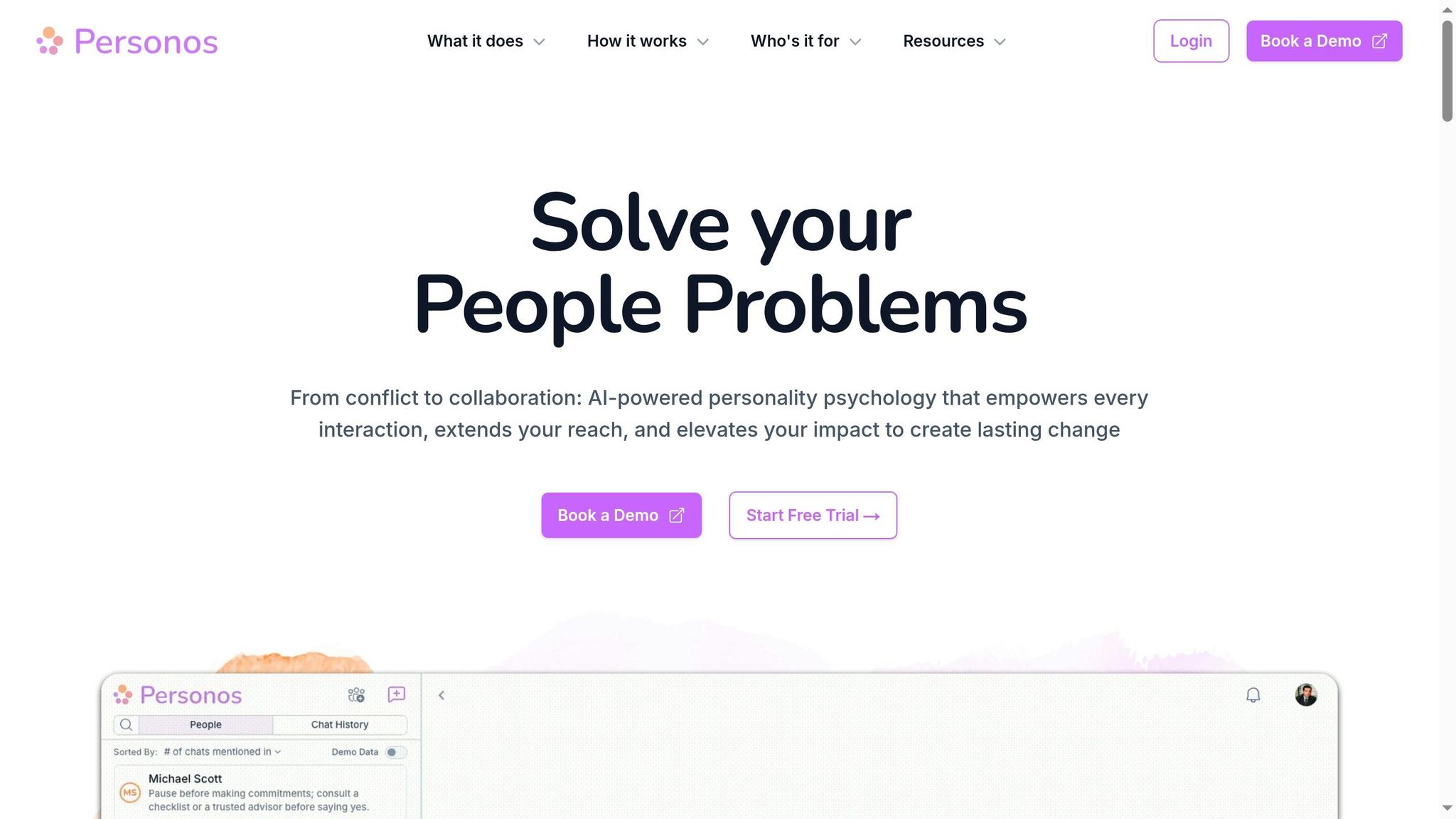
Personos is an AI-powered personality psychology platform designed to help nonprofits build stronger connections with their stakeholders. By utilizing the Five Factor Model (FFM) alongside artificial intelligence, Personos provides detailed insights into individual traits and communication styles. This allows organizations to engage with donors, volunteers, and beneficiaries in a way that feels more personal and impactful.
By tailoring every interaction, Personos helps nonprofits create meaningful connections, ultimately leading to better engagement and outcomes.
Key Features
Personos comes packed with tools to enhance communication. Its AI-driven conversational interface delivers personalized advice in real time, adapting to specific personalities and situations. This feature equips nonprofit staff with practical guidance on how to approach and interact with different donors or volunteers effectively.
The platform also generates personality reports, offering tailored insights at individual, relationship, and group levels. These reports help nonprofits identify the best communication strategies for various stakeholder groups. Additionally, proactive communication prompts provide staff with suggestions on when and how to reach out to specific individuals, ensuring timely and thoughtful engagement. For team and volunteer management, the group dynamics analysis feature reveals how different personalities interact, highlighting potential areas of conflict and opportunities for collaboration. Importantly, all interactions are privacy-focused, with data accessible only to authorized users. Best of all, these features are offered at a price that fits nonprofit budgets.
Pricing (USD)
Personos Pro is available for just $9 per seat per month, making it easy for organizations to scale the platform according to their team size and specific needs.
Primary Nonprofit Application
Nonprofits can use Personos in a variety of ways. For donor relationship management, the platform helps staff understand and cater to diverse communication preferences, strengthening relationships. In volunteer coordination, Personos aligns roles with individual personality profiles, ensuring volunteers are placed where they thrive. The platform also supports conflict resolution and team building, enabling teams to navigate interpersonal challenges while working more effectively together.
Integration Capabilities
Personos takes integration a step further by allowing organizations to upload custom client context fields, such as client goals, case notes, and current strategies. These fields seamlessly integrate into the platform’s chat responses, reports, and AI-generated recommendations. By aligning with a nonprofit's existing data and mission, Personos ensures that every insight feels relevant and actionable [1].
2. DonorSearch AI
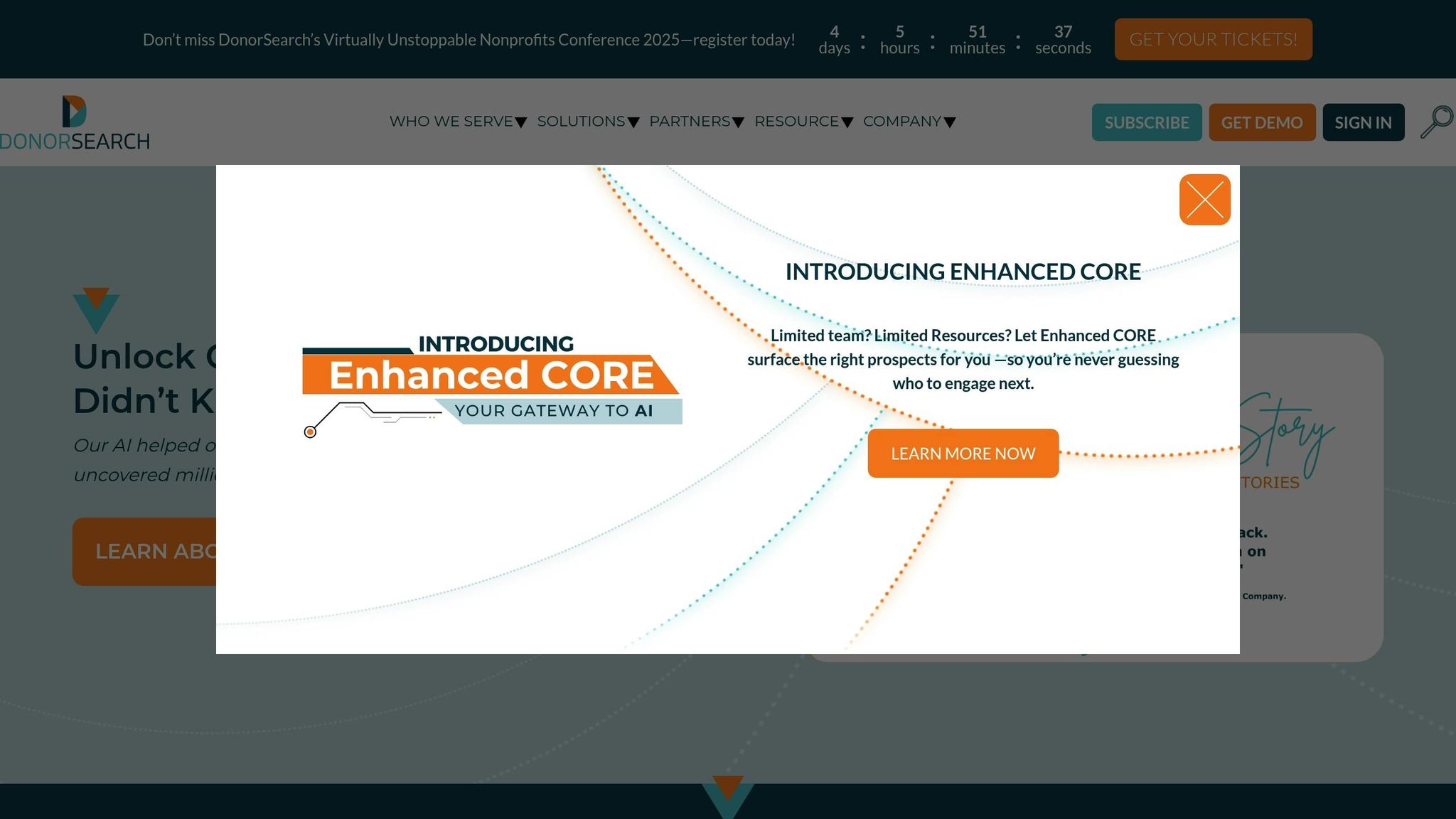
DonorSearch AI works effortlessly with more than 40 CRM and nonprofit fundraising systems [2]. This integration ensures donor information stays up-to-date while simplifying data management, making operations run more smoothly.
3. Momentum
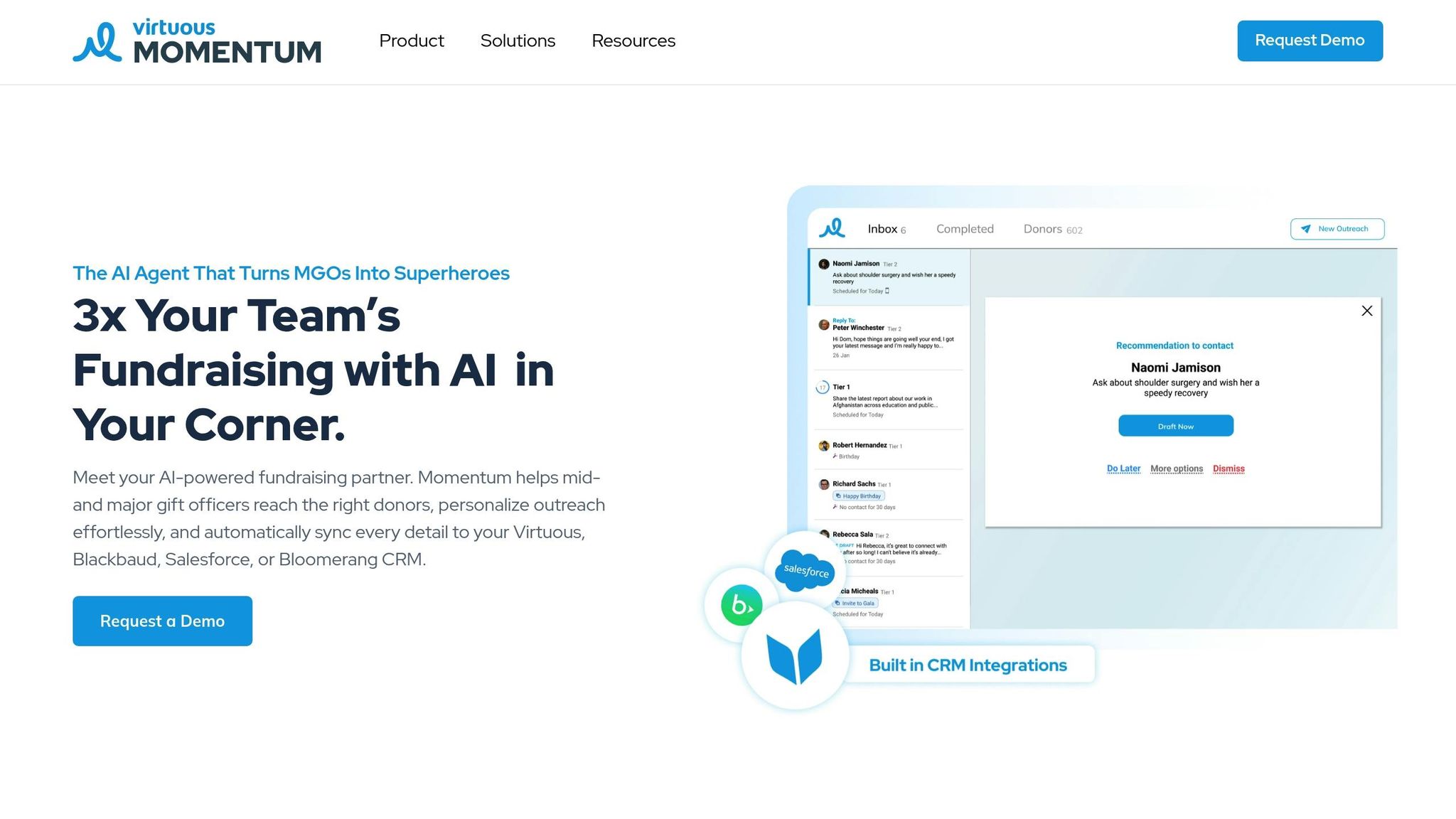
Momentum simplifies nonprofit fundraising by providing real-time data integrations. It ensures donor and fundraising data are always up-to-date, helping organizations operate more efficiently.
Integration Capabilities
Momentum offers a wide range of integrations designed to improve nonprofit workflows. Here’s how it connects with key tools and platforms:
- CRM Platforms: Momentum works seamlessly with popular systems like Salesforce NPSP, Salesforce, Raiser's Edge NXT, Bloomerang, Blackbaud CRM, and DonorPerfect. This allows donor and fundraising data to sync automatically.
- Payment Processing: It supports Stripe for credit card payments, GivingBlock for cryptocurrency donations, Chariot for donor-advised fund gifts, and DonateStock for stock transfers.
- Prospect Research: The platform integrates with Target Analytics, Research Point, and DonorSearch to pull wealth screening data, aiding in donor prospecting.
- Website Integration: A simple code snippet makes it compatible with website builders like WordPress, Wix, Weebly, and Squarespace.
- Email Marketing: Momentum connects with Outlook and Gmail, streamlining email campaigns.
- Tracking and Analytics: It integrates with Meta Pixel for monitoring Facebook ad performance and Google Analytics (GA4) to track donor journeys.
- Planned Giving: Through GivingDocs, Momentum helps nonprofits engage with legacy donors, making planned giving strategies more effective.
sbb-itb-f8fc6bf
4. Knack
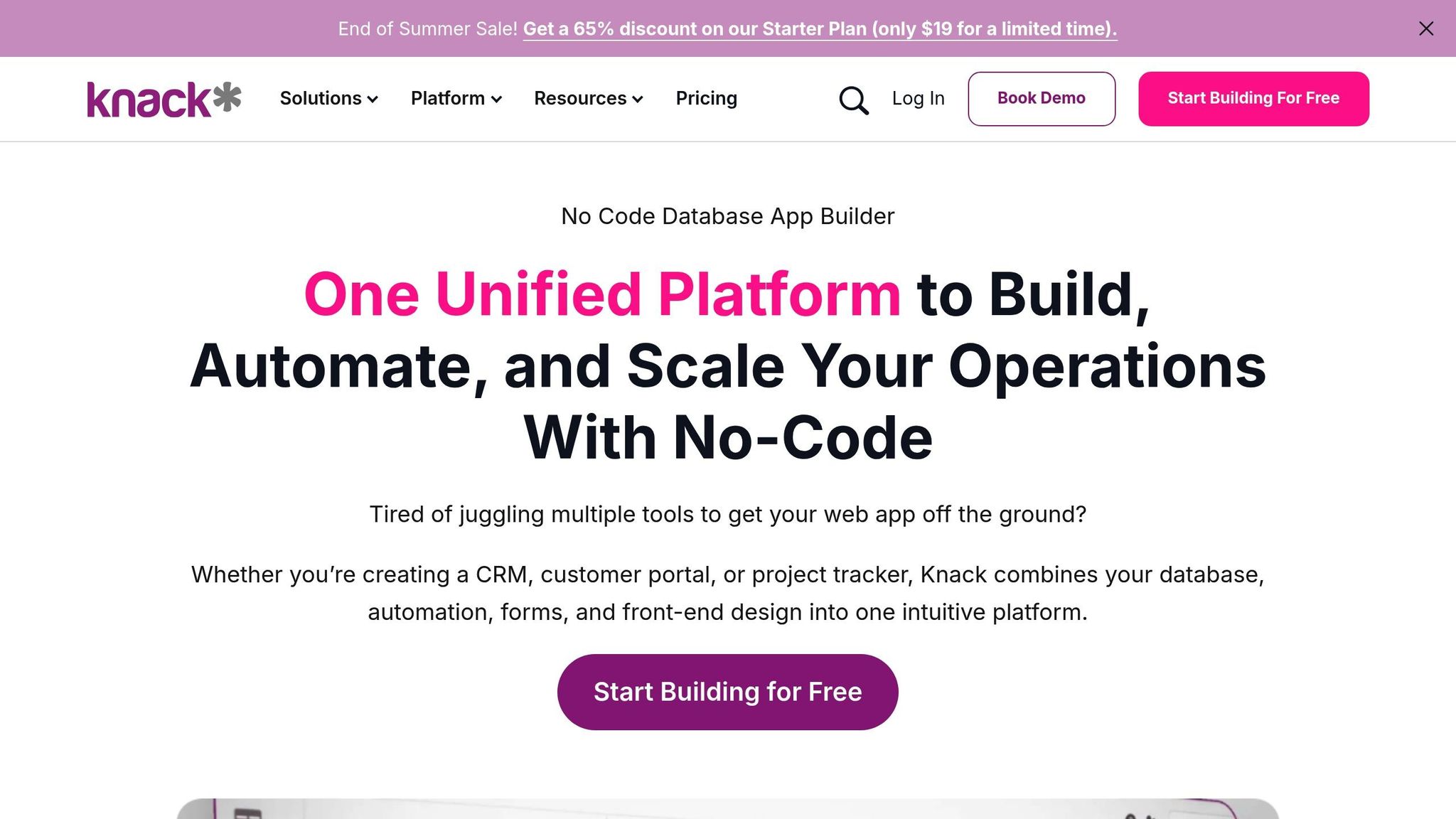
Knack is a no-code platform designed to help nonprofits create tailored applications without requiring advanced technical skills.
Key Features
Knack allows nonprofits to build applications such as:
- Donor management systems: Custom CRMs to track and manage donor relationships.
- Volunteer management tools: Platforms to organize and monitor volunteer activities.
- Member portals: Spaces for fostering community engagement.
- Project management solutions: Tools to oversee and coordinate programs and initiatives.
These tools simplify and centralize essential nonprofit tasks.
How Nonprofits Use Knack
Nonprofits can use Knack to streamline their day-to-day operations. From managing donor interactions to coordinating volunteers and tracking projects, the platform provides a flexible foundation to support their mission and improve efficiency.
5. Grantable
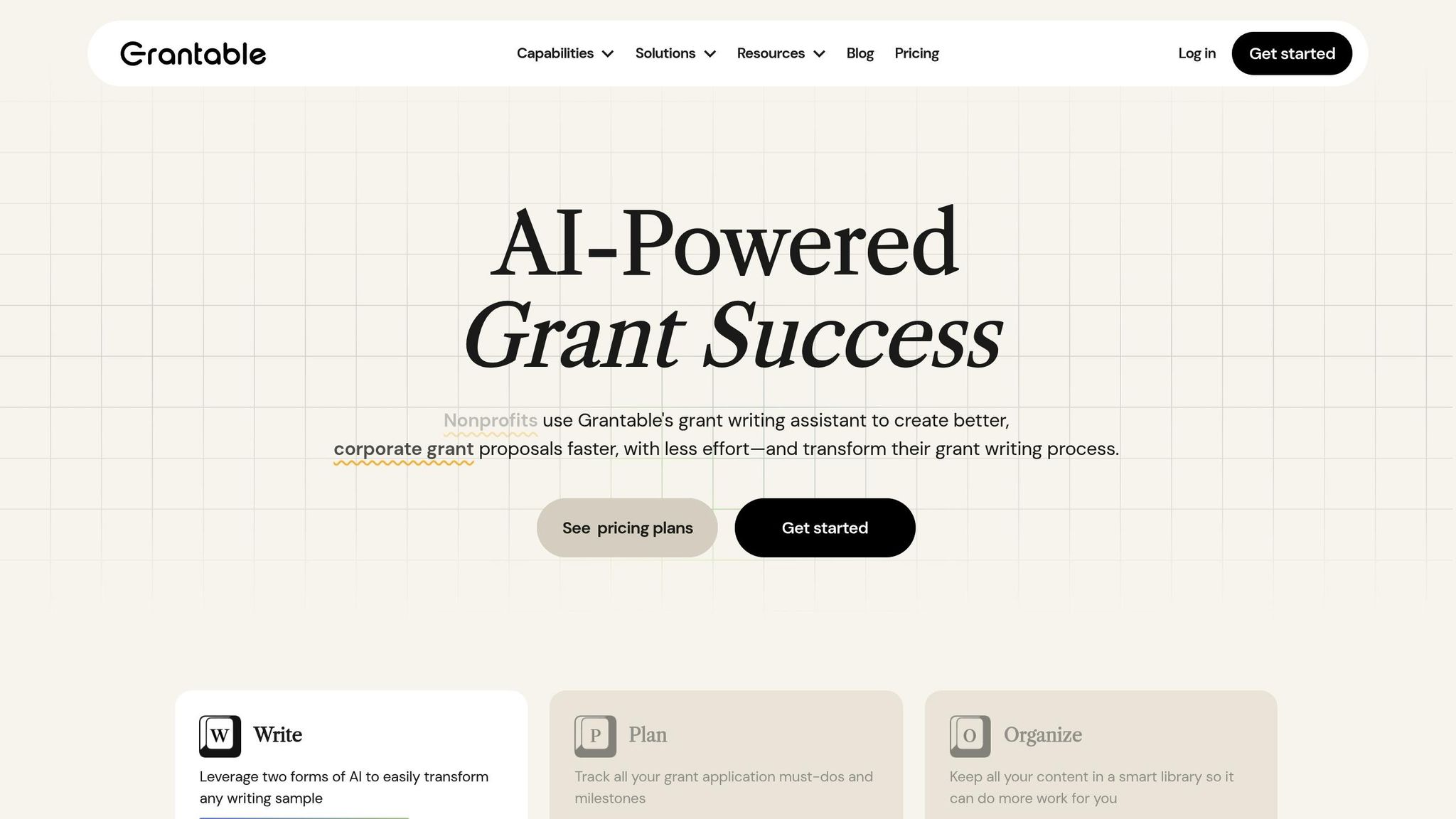
Grantable is designed to make grant writing and application management easier for nonprofits. By simplifying the drafting, editing, and submission process, it helps reduce the time and effort spent on administrative tasks, speeding up the journey to securing funding.
One standout feature is its ability to integrate smoothly with cloud storage platforms like Google Drive and Dropbox. This allows teams to organize and access their grant documents effortlessly, all within the tools they already know and use.
Tool Comparison Chart
After diving into the detailed reviews, here's a concise chart to help you quickly grasp the standout features of Personos. Choosing the right AI tool for nonprofits can feel overwhelming, especially when it comes to improving internal communication and managing team dynamics. This comparison zeroes in on the verified features of Personos to simplify your decision-making process.
| Tool | Primary Use Cases | Key Features | Pricing | Integration Options |
|---|---|---|---|---|
| Personos | Team dynamics, conflict resolution, communication coaching | AI-powered conversational interface, dynamic personality reports, proactive communication prompts, group analysis | $9 per seat per month | Privacy-focused platform with user-only visibility |
This chart underscores how Personos stands out by offering real-time insights and tools designed to strengthen team interactions and resolve conflicts effectively. Its privacy-first approach ensures user data stays secure while delivering practical solutions for improving internal team collaboration.
Final Thoughts
AI tools are reshaping how nonprofits work, making day-to-day tasks - like donor management and grant writing - more efficient. By automating these processes, organizations can focus more on what truly matters: advancing their mission.
Take a moment to think about the specific hurdles your nonprofit is facing. Whether it’s improving communication, boosting fundraising efforts, or streamlining grant applications, there’s likely an AI tool that can address those needs.
Start small with a pilot program. Many platforms offer free trials or budget-friendly starter plans, making it easy to test a tool for 30–60 days. This trial period allows you to see how it impacts your operations before committing to additional AI solutions. A step-by-step approach ensures a smoother integration process.
Keep in mind, even the best tools won’t succeed without your team’s support. Training and onboarding are key. Spend time familiarizing your staff with the platform’s features and encourage them to share their feedback. This not only boosts confidence but also ensures you’re getting the most out of the tool’s capabilities.
While nonprofits have traditionally been slower to adopt new technologies, AI solutions specifically designed for mission-driven organizations are changing the game. These tools can help you work smarter, connect with supporters more effectively, and amplify the positive impact you’re making in your community.
FAQs
How can AI tools like Personos help nonprofits engage donors and volunteers more effectively?
AI tools like Personos help nonprofits build stronger connections with donors and volunteers through tailored communication and streamlined management. These tools take care of tasks like scheduling volunteer events, sending personalized thank-you notes, and analyzing donor data to spot top supporters.
With these features, nonprofits can deepen relationships, boost involvement, and encourage long-term loyalty - all while saving valuable time to focus on what truly matters: their mission.
What factors should nonprofits consider when selecting an AI tool to integrate with their systems?
When selecting an AI tool, nonprofits need to focus on data quality. Having accurate and relevant data is essential for training and using AI effectively. Without it, the tool may not perform as intended or provide meaningful insights.
It's equally important to evaluate the tool's compatibility with existing systems. Look for integration options like APIs or pre-built connectors to ensure the new tool works seamlessly with your current setup. This helps avoid disruptions and makes the adoption process smoother.
Nonprofits should also weigh the ethical considerations of their choice. Factors like fairness, transparency, and data security are crucial to ensure the AI aligns with the organization's mission and values. By keeping these aspects in mind, nonprofits can adopt a solution that improves operations without compromising their principles.
How can nonprofits use AI tools effectively while protecting data privacy and security?
Nonprofits can make the most of AI tools while keeping data privacy and security front and center by adhering to a few essential practices. First, ensure your organization complies with privacy regulations like GDPR or CCPA. Pair this with robust technical measures such as encryption and strict access controls to protect sensitive information.
It’s also important to routinely audit your AI systems to identify and address any biases or inaccuracies that may arise. Transparency is key - be upfront about how AI tools are used and how decisions are made. Always prioritize ethical data handling, secure stakeholder consent when needed, and regularly update your policies to keep pace with changing standards. These actions not only protect data but also build trust and demonstrate a commitment to responsible AI use in nonprofit work.